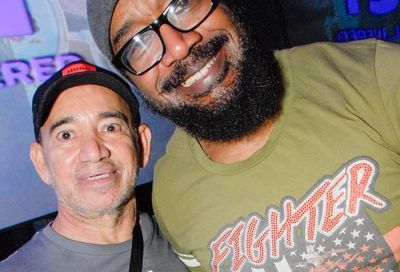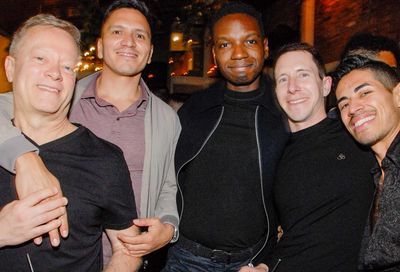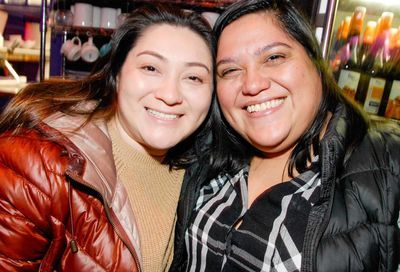DOJ Seeks Quick Court Action Against DOMA, As Health Benefits Begin for Karen Golinski’s Wife
On Monday, March 26, the Department of Justice took aggressive action to move forward the case of a California federal court employee, Karen Golinski, who is beginning to receive equal health insurance coverage for her wife as a result of the trial-court win in her ongoing lawsuit challenging the constitutionality Defense of Marriage Act.
Calling the resolution of the case a “constitutional question of exceptional importance and urgency,” DOJ lawyers — with Golinski’s support — are seeking to speed up the appeal with the aim of resolving whether Section 3 of DOMA, which defines “marriage” and “spouse” as pertaining only to opposite-sex couples, unconstitutionally discriminates based on sexual orientation.
If DOJ lawyers have their way, an 11-judge en banc panel of the U.S. Court of Appeals for the Ninth Circuit will be considering the case of Golinski v. Office of Personnel Management well before the presidential election this November.
Additionally, even as the appeal is pending, OPM has directed Golinski’s insurer to begin providing equal coverage for her wife, Amy Cunninghis.
 Golinski, represented by Lambda Legal Defense and Education Fund, has argued — and the Obama administration has agreed for the past year — that DOMA, to the extent that it bars such equal coverage, is unconstitutional. On Feb. 22, U.S. District Court Judge Jeffrey White agreed — but two days later attorneys representing the House Republican leadership-led Bipartisan Legal Advisory Group told the court that BLAG would be appealing White’s ruling.
Golinski, represented by Lambda Legal Defense and Education Fund, has argued — and the Obama administration has agreed for the past year — that DOMA, to the extent that it bars such equal coverage, is unconstitutional. On Feb. 22, U.S. District Court Judge Jeffrey White agreed — but two days later attorneys representing the House Republican leadership-led Bipartisan Legal Advisory Group told the court that BLAG would be appealing White’s ruling.
On Monday, DOJ filed two motions in the appeal before the Ninth Circuit, both of which were agreed to by Golinski. The first asks the court to expedite the appeal and the other seeks to skip over the first stage of appellate review, in which a three-judge panel considers the case, in favor of moving directly to en banc consideration by an 11-judge panel of the court.
WHY THE REQUEST: In 1990, the Ninth Circuit had decided that discriminatory government treatment based on sexual orientation — brought as a claim of “equal protection” violations under the Fourteenth or Fifth amendments — is subjected to the lowest form of scrutiny, rational basis review. That case, High Tech Gays v. Defense Indus. Sec. Clearance Office, was decided four years after the Supreme Court upheld the constitutionality of sodomy laws in Bowers v. Hardwick.
Twenty-two years later, and several Supreme Court cases — most notably the 1996 case of Romer v. Evans and the 2003 case overturning Bowers, Lawrence v. Texas — call into question the ongoing validity of High Tech Gays. DOJ argues that heightened scrutiny should apply to such claims.
In explaining its request for initial en banc consideration, DOJ argues, “Whereas a panel of this Court [under Ninth Circuit rules] would need to examine whether High Tech Gays continues to bind panels of this Court, the en banc Court could avoid that inquiry and could instead directly consider afresh whether, as the government argues, heightened scrutiny applies to classifications based on sexual orientation.”
DOJ goes on to argue, “And because the resolution of that threshold question will have substantial implications for the resolution of this case, en banc consideration is warranted to provide an expeditious and definitive resolution to plaintiff’s challenge to Section 3 of DOMA.”
If the court grants the request for the en banc hearing, DOJ asks in the request for expedited consideration that the first briefs be due in the appeal 30 days from the date the court grants the en banc hearing and asks that arguments be scheduled “at the next possible en banc sitting after briefing is completed.”
If the court denies the en banc request, DOJ asks that the argument of the three-judge panel be set “at the first available sitting after the completion of briefing, and in any event no later than in September 2012.”
The move comes as the Ninth Circuit considers whether to hear the Perry v. Brown challenge to Proposition 8 en banc after a three-judge panel held that it is unconstitutional and a week before a three-judge panel of the U.S. Court of Appeals for the First Circuit considers another DOMA challenge, Gill v. OPM.
WHERE IS BLAG: In addition to DOJ’s aggressive action to move the case forward quickly is the notable lack of action from BLAG thus far.
As reported first by The Washington Post on Monday evening, OPM sent a letter to Blue Cross and Blue Shield on March 9 informing the insurer that, in accordance with White’s decision, “OPM hereby withdraws any outstanding directive regarding the enrollment of Ms. Golinski’s wife, Amy C. Cunninghis, in her family health benefits plan.”
In other words, Golinski — because of the trial-court decision — has won for the time being.
Unlike in, for example, the challenge to Proposition 8, there has been no request made to stay, or halt, the implementation of the trial-court ruling while the decision is appealed. BLAG could have, but thus far has not, sought a stay of White’s ruling pending any appeal.
Accordingly, OPM — with the March 9 letter — began implementing the decision.
As DOJ notes in Monday’s filing, Golinski’s “spouse will now, pursuant to the district court’s order, be permitted to enroll in [the Federal Employees Health Benefit Program], but will not know if she can stay in FEHBP — and, if she became ill, be able to continue to rely on her insurance through that program — until final resolution of these cases.”
Although Golinski agreed to the expedited and en banc requests, DOJ’s filing states that the lawyers representing BLAG “ha[ve] indicated that BLAG will file a separate response.”
Support Metro Weekly’s Journalism
These are challenging times for news organizations. And yet it’s crucial we stay active and provide vital resources and information to both our local readers and the world. So won’t you please take a moment and consider supporting Metro Weekly with a membership? For as little as $5 a month, you can help ensure Metro Weekly magazine and MetroWeekly.com remain free, viable resources as we provide the best, most diverse, culturally-resonant LGBTQ coverage in both the D.C. region and around the world. Memberships come with exclusive perks and discounts, your own personal digital delivery of each week’s magazine (and an archive), access to our Member's Lounge when it launches this fall, and exclusive members-only items like Metro Weekly Membership Mugs and Tote Bags! Check out all our membership levels here and please join us today!






















